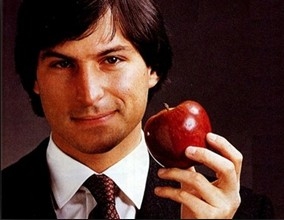Jobs’s prickly behavior was partly driven by his perfectionism and his impatience with those who made compromises in order to get a product out on time and on budget. “He could not make trade-offs well,” said Atkinson. “If someone didn’t care to make their product perfect, they were a bozo.” At the West Coast Computer Faire in April 1981, for example, Adam Osborne released the first truly portable personal computer. It was not great—it had a five-inch screen and not much memory—but it worked well enough. As Osborne famously declared, “Adequacy is sufficient. All else is superfluous.” Jobs found that approach to be morally appalling, and he spent days making fun of Osborne. “This guy just doesn’t get it,” Jobs repeatedly railed as he wandered the Apple corridors. “He’s not making art, he’s making shit.”
喬布斯這種帶刺的行為,一定程度上是受到了兩種因素的驅(qū)使:一是他的完美主義,二就是,他無(wú)法容忍那些為了讓產(chǎn)品及時(shí)面世或?yàn)榱藟嚎s成本而作出合理(甚至明智)妥協(xié)的人。“他不會(huì)在產(chǎn)品上作出妥協(xié),”阿特金森說(shuō),“他是個(gè)控制欲極強(qiáng)的完美主義者。如果哪個(gè)人不愿意把產(chǎn)品做到完美,那他就是笨蛋。”舉例來(lái)說(shuō),1981年的西海岸計(jì)算機(jī)展銷(xiāo)會(huì)上,亞當(dāng)·奧斯本(AdamOsbome)發(fā)布了第一款真正意義上的便攜式個(gè)人電腦。它并不出眾——屏幕只有5英寸、內(nèi)存也不大——但運(yùn)行狀況尚可。正如奧斯本那旬著名的宣言:“夠用就好,多出來(lái)的功能都是浪費(fèi)。”喬布斯認(rèn)為這整個(gè)想法都是可怕的,好幾天的時(shí)間里他都在嘲笑奧斯本。“這家伙就是不明白,”他走在蘋(píng)果公司的走廊里還反復(fù)罵道,“他不是在創(chuàng)造藝術(shù)品,而是在制造垃圾。”
One day Jobs came into the cubicle of Larry Kenyon, an engineer who was working on the Macintosh operating system, and complained that it was taking too long to boot up. Kenyon started to explain, but Jobs cut him off. “If it could save a person’s life, would you find a way to shave ten seconds off the boot time?” he asked. Kenyon allowed that he probably could. Jobs went to a whiteboard and showed that if there were five million people using the Mac, and it took ten seconds extra to turn it on every day, that added up to three hundred million or so hours per year that people would save, which was the equivalent of at least one hundred lifetimes saved per year. “Larry was suitably impressed, and a few weeks later he came back and it booted up twenty-eight seconds faster,” Atkinson recalled. “Steve had a way of motivating by looking at the bigger picture.”
一天,喬布斯走進(jìn)了拉里·凱尼恩(LarryKenyon)的辦公隔間,他是負(fù)責(zé)麥金塔電腦操作系統(tǒng)的工程師,喬布斯抱怨說(shuō)開(kāi)機(jī)啟動(dòng)時(shí)間太長(zhǎng)了。凱尼恩開(kāi)始解釋,但喬布斯打斷了他。他問(wèn)道:“如果能救人一命的話,你愿意想辦法讓啟動(dòng)時(shí)間縮短10秒鐘嗎?”凱尼恩說(shuō)也許可以。喬布斯于是走到一塊白板前開(kāi)始演示,如果有500萬(wàn)人使用Mac,而每天開(kāi)機(jī)都要多用10秒鐘,那加起來(lái)每年就要浪費(fèi)大約3億分鐘,而3億分鐘相當(dāng)于至少100個(gè)人的終身壽命。“這番話讓拉里十分震驚,幾周過(guò)后,喬布斯再來(lái)看的時(shí)候,啟動(dòng)時(shí)間縮短了28秒,”阿特金森回憶說(shuō),“史蒂夫能看到宏觀層面,從而激勵(lì)別人工作。”
The result was that the Macintosh team came to share Jobs’s passion for making a great product, not just a profitable one. “Jobs thought of himself as an artist, and he encouraged the design team to think of ourselves that way too,” said Hertzfeld. “The goal was never to beat the competition, or to make a lot of money. It was to do the greatest thing possible, or even a little greater.” He once took the team to see an exhibit of Tiffany glass at the Metropolitan Museum in Manhattan because he believed they could learn from Louis Tiffany’s example of creating great art that could be mass-produced. Recalled Bud Tribble, “We said to ourselves, ‘Hey, if we’re going to make things in our lives, we might as well make them beautiful.’”
受到喬布斯的影響,麥金塔團(tuán)隊(duì)也充滿激情地要制造一臺(tái)完美的產(chǎn)品,而不僅僅是可以賺錢(qián)的產(chǎn)品。“喬布斯認(rèn)為自己是藝術(shù)家,他鼓勵(lì)設(shè)計(jì)團(tuán)隊(duì)的人把自己也當(dāng)成藝術(shù)家,”赫茨菲爾德說(shuō),“我們的目標(biāo)從來(lái)都不是打敗競(jìng)爭(zhēng)對(duì)手,或者是狠賺一筆,而是做出最好的產(chǎn)品,甚至比最好的還要好一點(diǎn)兒。”喬布斯還帶著團(tuán)隊(duì)去曼哈頓的大都會(huì)博物館參觀蒂芙尼的玻璃制品展覽,因?yàn)樗X(jué)得,大家可以從路易斯·蒂芙尼(LouisTiffany)創(chuàng)造出可以量產(chǎn)的偉大藝術(shù)品這個(gè)例子中獲益匪淺。“我們談?wù)摰溃@些玻璃制品并不都是路易斯·蒂芙尼親手制作的,但他成功地將自己的設(shè)計(jì)傳授給了別人巴德·特里布爾回憶道,“我們對(duì)自己說(shuō),‘既然我們要制造產(chǎn)品,何不也把它做得漂亮點(diǎn)兒呢?’”
Was all of his stormy and abusive behavior necessary? Probably not, nor was it justified. There were other ways to have motivated his team. Even though the Macintosh would turn out to be great, it was way behind schedule and way over budget because of Jobs’s impetuous interventions. There was also a cost in brutalized human feelings, which caused much of the team to burn out. “Steve’s contributions could have been made without so many stories about him terrorizing folks,” Wozniak said. “I like being more patient and not having so many conflicts. I think a company can be a good family. If the Macintosh project had been run my way, things probably would have been a mess. But I think if it had been a mix of both our styles, it would have been better than just the way Steve did it.”
他所有這些暴躁、惡劣的行為都是必要的嗎?也許不是,而且這些行為也并不都是合乎情理的。還有其他方式可以激勵(lì)他的團(tuán)隊(duì)。盡管麥金塔電腦后來(lái)被證明是一件偉大的產(chǎn)品,但由于喬布斯的魯莽干預(yù),它的生產(chǎn)進(jìn)度已遠(yuǎn)遠(yuǎn)落后,預(yù)算也嚴(yán)重超支。受到殘酷對(duì)待的員工在感情上也很受傷,大多數(shù)人都已心力交瘁。“史蒂夫用不著讓員工如此恐懼也可以為團(tuán)隊(duì)作出他的貢獻(xiàn),”沃茲尼亞克說(shuō),“我喜歡更加耐心一點(diǎn)兒,不要有那么多矛盾沖突。我覺(jué)得一家公司可以像一個(gè)和睦的家庭一樣。如果麥金塔項(xiàng)目是以我的方式運(yùn)行的話,事情可能會(huì)一團(tuán)糟。但我想,如果能把我們兩人的風(fēng)格中和一下的話,結(jié)果會(huì)比只用史蒂夫的方式要好一點(diǎn)兒。”
But even though Jobs’s style could be demoralizing, it could also be oddly inspiring. It infused Apple employees with an abiding passion to create groundbreaking products and a belief that they could accomplish what seemed impossible. They had T-shirts made that read “90 hours a week and loving it!” Out of a fear of Jobs mixed with an incredibly strong urge to impress him, they exceeded their own expectations. “I’ve learned over the years that when you have really good people you don’t have to baby them,” Jobs later explained. “By expecting them to do great things, you can get them to do great things. The original Mac team taught me that A-plus players like to work together, and they don’t like it if you tolerate B work. Ask any member of that Mac team. They will tell you it was worth the pain.”
然而,喬布斯的行事風(fēng)格也有其優(yōu)勢(shì)。它給蘋(píng)果的員工們注入了持久的熱情,讓他們?nèi)?chuàng)造革命性的產(chǎn)品,也讓他們相信,自己可以完成看上去不可能完成的事情。他們制作了T恤,上面寫(xiě)著“我愛(ài)每周工作90個(gè)小時(shí)”。出于對(duì)喬布斯的畏懼以及想取悅他的強(qiáng)烈愿望,他們的工作都超出了自己的預(yù)想。雖然喬布斯禁止團(tuán)隊(duì)為了降低Mac成本或是趕進(jìn)度而在產(chǎn)品上作出讓步,但這也同時(shí)阻止了一些看似合理實(shí)則粗劣的折中方案。 “多年以來(lái),我認(rèn)識(shí)到,當(dāng)你擁有真正優(yōu)秀的人才時(shí),你不必對(duì)他們太縱容,”喬布斯后來(lái)解釋說(shuō),“你期待他們做出好成績(jī),你就能讓他們做出好成績(jī)。最初的Mac團(tuán)隊(duì)讓我知道,最頂級(jí)的人才喜歡一起工作,而且他們是不能容忍平庸的作品的。你到那個(gè)Mac團(tuán)隊(duì)里隨便找個(gè)人問(wèn)問(wèn)。他們會(huì)告訴你,那些痛苦都是值得的。”
Most of them agree. “He would shout at a meeting, ‘You asshole, you never do anything right,’” Debi Coleman recalled. “It was like an hourly occurrence. Yet I consider myself the absolute luckiest person in the world to have worked with him.”
大多數(shù)人確實(shí)這么認(rèn)為。“他會(huì)在開(kāi)會(huì)的時(shí)候大喊:‘你這個(gè)蠢貨,你從來(lái)就沒(méi)有把事情做對(duì)過(guò)。’”黛比·科爾曼回憶道,“類似的事情好像每個(gè)小時(shí)都會(huì)發(fā)生。但我還是認(rèn)為,能夠和他并肩作戰(zhàn),我真的是世界上最幸運(yùn)的人了。”——
注釋:
①俄國(guó)尼古拉二世時(shí)的神秘主義者、俄國(guó)沙皇及皇后的寵臣,有高超的催眠術(shù)。
②俄國(guó)藝術(shù)評(píng)論家,創(chuàng)辦了著名的俄國(guó)芭蕾舞團(tuán)。











